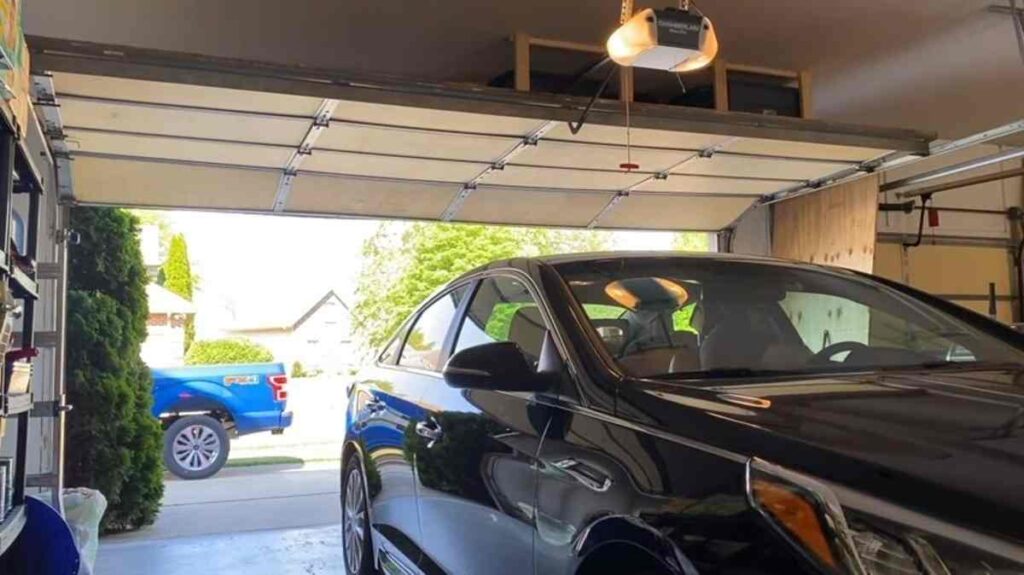Affiliate Disclosure: We may earn money or products from the companies mentioned in this post.
Automatic garage door openers have become a standard feature in modern homes, providing convenience and security to homeowners. However, like any mechanical device, they will eventually wear out and must be replaced. The question is, how long can you expect your automatic garage door opener to last? This question has likely crossed the minds of many homeowners who rely on their garage door openers daily.
Curiosity about the lifespan of automatic garage door openers is understandable, especially if you’ve invested a significant amount of money in your garage door system. A malfunctioning garage door opener can cause inconvenience, property damage, or even pose a safety risk to you and your family. Knowing when to replace your garage door opener can save you from costly repairs or accidents in the future.
While there’s no definitive answer to how long an automatic garage door opener will last, it’s important to invest in a high-quality model, use it responsibly, and take care of it with regular maintenance. By doing so, you can help extend the lifespan of your opener and enjoy reliable, hassle-free operation for years to come.
Can an automatic garage door opener last more than ten years?
An automatic garage door opener can last more than ten years with proper care and maintenance. Investing in a high-quality opener, using it appropriately, and performing regular maintenance can help extend its lifespan. If you’re unsure whether your garage door opener needs to be replaced, it’s always a good idea to consult a professional garage door technician. They can assess the condition of your opener and help you determine whether it’s time for a replacement.
One of the most critical factors that affect the lifespan of your garage door opener is the quality of the opener itself. Investing in a high-quality garage door opener from a reputable manufacturer can make all the difference. Not only are these openers built to last, but they also come with warranties that provide additional protection.
Another factor that affects the lifespan of your garage door opener is how often it’s used. If you use your garage door multiple times a day, it will wear out faster than if you only use it a few times a week. However, most modern garage door openers are designed to handle heavy usage, so this shouldn’t be a significant concern.
Regular maintenance is another essential factor that can extend the lifespan of your garage door opener. Lubricating moving parts, tightening screws and bolts, and checking the door’s balance can all help prevent wear and tear on your garage door opener. Watching for any signs of wear and tear, such as unusual noises or slow operation, is also crucial. Addressing these issues promptly can help prevent more significant problems down the line.
What are the signs that my garage door opener is nearing the end of its lifespan?

Not only does it ensure your garage door operates smoothly and safely, but it also provides peace of mind knowing that your home is secure. However, even the most well-maintained garage door opener will eventually reach the end of its lifespan.
- Slow operation: If your garage door takes longer than usual to open or close, it could be a sign that your opener is struggling to keep up. This could be due to worn-out gears or a motor starting to fail.
- Noisy operation: Garage door openers are designed to operate quietly, so if you notice an increase in noise when your garage door opens or closes, it could be a sign that your opener is wearing out.
- Reversing or not responding: If your garage door opener is reversing when it shouldn’t or not responding to your commands, it could be a sign of a malfunctioning sensor or circuit board. This can be a serious safety issue and should be addressed immediately.
- Age: Garage door openers have a lifespan like most things in life. Most openers last between 10-15 years, so if your opener is approaching or exceeding that age range, it may be time to consider a replacement.
- Repairs becoming more frequent: If you call a garage door repair technician more frequently than usual, it may be a sign that your opener is on its last legs. Continuously repairing an old opener can cost you more money in the long run than investing in a new one.
Is it possible to repair a garage door opener, or is a replacement necessary?
If your garage door opener has suffered significant damage or has been in use for a long time, repair may not be a feasible option. In these cases, replacement may be the best course of action. It is important to note that a new garage door opener will likely come with additional features and enhanced safety features that older models may lack. This can help improve the security of your home and make your garage more convenient to use.
The cost is an important factor when deciding whether to repair or replace your garage door opener. Repairing a garage door opener is generally less expensive than replacing it. However, if your garage door opener is older and has been repaired multiple times, the cost of repairs can add up quickly. In this case, replacing the entire system may be more cost-effective.
It is also worth considering the age of your garage door opener. If your opener is over 15 years old, it may be reaching the end of its lifespan. Older models may not have the same safety features and may be more prone to malfunctioning. In these cases, replacing your garage door opener may be the safest option.
Ultimately, the decision to repair or replace your garage door opener will depend on various factors, including the extent of the damage, the age of your system, and your budget. If you are unsure which option is best for you, consulting with a professional garage door technician is always best. They can assess the condition of your garage door opener and provide recommendations based on your specific situation.
How much does it cost to replace an automatic garage door opener?
The cost of replacing an automatic garage door opener can vary depending on several factors, including the type of opener you choose, the complexity of the installation, and your location. On average, homeowners can expect to pay between $250 to $500 for a basic garage door opener replacement, with high-end models costing upwards of $1,000.
When considering the cost of a garage door opener replacement, it is also important to factor in the long-term savings of investing in a high-quality opener. High-end models often come with features such as Wi-Fi connectivity, battery backup, and smart home integration, which can provide added convenience and security for your home.
To give you a better idea of the average cost of garage door opener replacements, here is a breakdown of the cost based on different factors:
| Type of Opener | Average Cost |
|---|---|
| Chain-drive Opener | $250 – $350 |
| Belt-drive Opener | $300 – $400 |
| Screw-drive Opener | $350 – $500 |
| Direct-drive Opener | $400 – $500 |
How often should I have my automatic garage door opener serviced?
The frequency at which you should have your garage door opener serviced depends on several factors, including the age of the opener, the frequency of use, and the environment in which it operates. As a general rule of thumb, it is recommended that you have your garage door opener serviced every year. However, if your opener is older or uses your garage door frequently, you may need to have it serviced more often.
If your garage door opener is over ten years old, it is recommended that you have it serviced every six months. This is because older openers are more prone to wear and tear, and regular maintenance can help identify and address potential problems before they become major. Additionally, if you use your garage door more than three times daily, you may want to consider servicing it every six months.
Another factor that can impact the frequency at which you should have your garage door opener serviced is the environment in which it operates. If your garage is in an area with harsh weather conditions, such as extreme heat, cold, or high humidity, your garage door opener may need to be serviced more often. These conditions can cause wear and tear on the opener’s components, leading to malfunctions and safety issues.
Are there any safety concerns with an aging garage door opener?
An aging garage door opener can pose safety concerns if it lacks modern safety and security features or if its parts have become worn or malfunction.
By following these tips and taking proactive steps to maintain or upgrade your garage door opener, you can ensure the safety and security of your home and family.
1. Lack of Safety Features
Older garage door openers may not have the latest safety features, such as infrared sensors that detect if something is in the way of the door closing. Without these features, a garage door could close on a person, pet, or object and cause serious injury or damage.
2. Malfunctioning Parts
Over time, the various parts of a garage door opener can wear out and malfunction. This could include the motor, springs, or even the remote control.
If any of these parts fail, the garage door could become stuck in the open or closed position, which could be a major security risk for your home.
3. Security Vulnerabilities
Older garage door openers may not be as secure as newer models. This is because older openers use a fixed code to communicate with the remote control. This means that anyone with a similar remote could potentially open your garage door.
Newer openers use a rolling code that changes every time the door is opened, making it much more difficult for someone to gain unauthorized access.
So, what can you do to ensure the safety of your aging garage door opener? Here are a few tips:
- Regular Maintenance: Schedule regular maintenance for your garage door opener, including lubrication of moving parts, an inspection of springs, and testing of safety features.
- Upgrade to a Newer Model: If your garage door opener is more than 10 years old, it may be time to consider upgrading to a newer model with the latest safety and security features.
- Install a Backup Battery: Power outages can occur anytime, and if your garage door opener relies on electricity, you could be stuck with a closed garage door. Installing a backup battery can ensure your garage door continues functioning even during an outage.
Can I use my smartphone to operate my garage door opener?
You can use your smartphone to operate your garage door opener. There are several options available on the market that allow you to control your garage door with just a few taps on your phone. Here are some things you need to know before making the switch:
1. Choose the Right Opener
Not all garage door openers are compatible with smartphone apps. You’ll need to choose an opener that has this capability or can add on this feature. Make sure to check the manufacturer’s website or consult with a professional to find the right model.
2. Download the App
Once you have the right opener, download the corresponding app onto your smartphone. These apps are usually available for both iOS and Android devices, and they’re usually free.
3. Connect Your Opener
After downloading the app, you must connect your garage door opener to your home’s Wi-Fi network. This process may vary depending on the opener you choose, so follow the manufacturer’s instructions carefully.
4. Test It Out
Once your opener is connected, please test it by opening and closing your garage door using your smartphone. This will allow you to ensure that everything is working correctly.
5. Keep Your Smartphone Secure
Since your smartphone is now the key to your garage, it’s important to keep it secure. Ensure your phone has a passcode or fingerprint reader to prevent unauthorized access. Additionally, avoid sharing your login credentials with anyone.
Conclusion
Automatic garage door openers are designed to last a long time, with an average lifespan of 10 to 15 years. However, several factors can affect their lifespan, including maintenance, usage, and climate. It’s important to regularly inspect and maintain your garage door opener to ensure it’s functioning optimally and to avoid unexpected breakdowns.
If you’re experiencing problems with your garage door opener, don’t hesitate to call a professional technician to have it fixed. Fixing it yourself could lead to further damage and additional repair costs.
To extend the lifespan of your garage door opener, consider installing a surge protector to protect against electrical surges and power fluctuations. You can also lubricate the moving parts of the opener regularly to reduce wear and tear and prevent rust.


